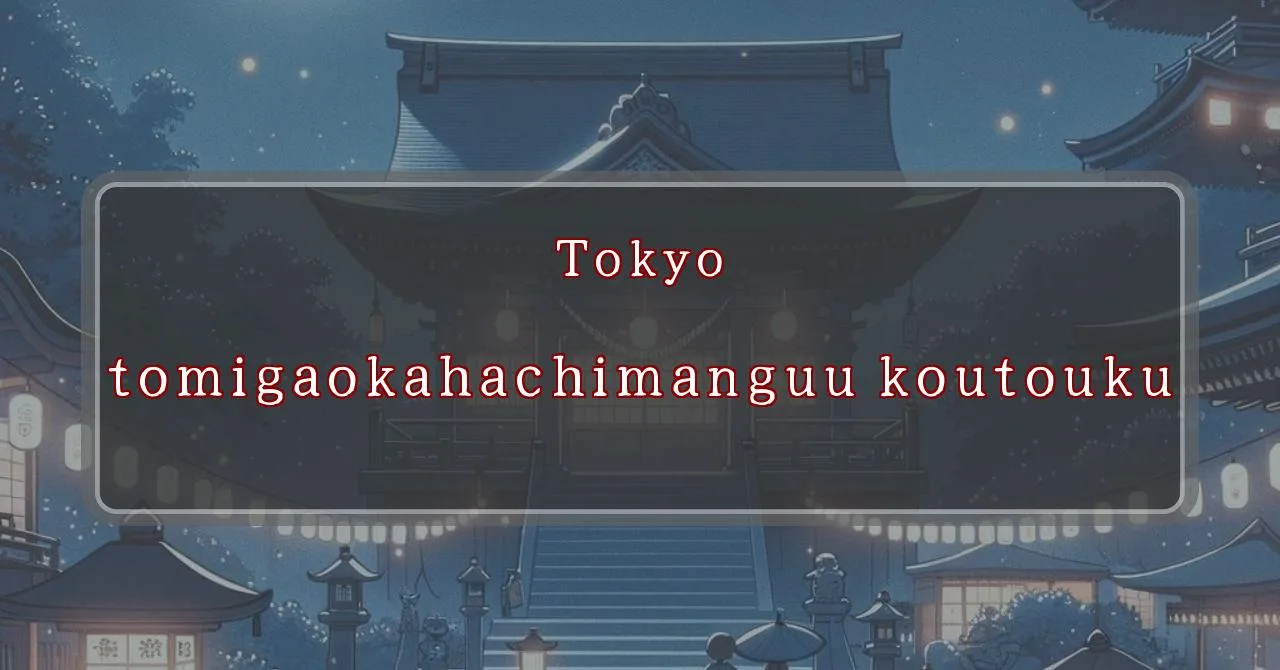Gleaming shrine, vibrant festival, a Tokyo summer dream
Basic Information
Tomioka Hachimangu Shrine is a Shinto shrine located in Fukagawa, Koto City, Tokyo, Japan.
- Address: 1-20-3 Tomioka, Koto City, Tokyo 135-0047
- Phone Number: 03-3642-1315
- Access: 3-minute walk from Tokyo Metro Tozai Line “Monzen-Nakacho” Station, 6-minute walk from Toei Oedo Line “Monzen-Nakacho” Station, 15-minute walk from JR Keiyo Line “Etchujima” Station
- Festival Days: August 11th (Thu/Holiday) – 15th (Tue), 2024
Main Events and Attractions of the Festival
The Tomioka Hachimangu Shrine Festival is a lively and colorful event that attracts many visitors each year. The main events and attractions of the festival include:
Mikoshi Procession
The highlight of the festival is the mikoshi procession, which takes place on August 13th. Over 120 mikoshi (portable shrines) are carried through the streets of Fukagawa by teams of people. The mikoshi are decorated with elaborate carvings and ornaments, and they are a sight to behold.
Bon Odori Dance
Another popular event at the festival is the Bon Odori dance. This traditional Japanese dance is performed by people of all ages, and it is a great way to experience Japanese culture. The Bon Odori dance is typically performed in a circle, and it is accompanied by music and singing.
Food and Games
There are also many food and game stalls at the festival. Visitors can enjoy a variety of Japanese street food, such as takoyaki, yakisoba, and okonomiyaki. There are also many games to play, such as goldfish scooping and ring toss.
Fireworks Display
The festival concludes with a spectacular fireworks display on August 15th. The fireworks are launched from a barge in the Sumida River, and they light up the night sky with their vibrant colors.
- Mikoshi Procession: Over 120 mikoshi are carried through the streets of Fukagawa.
- Bon Odori Dance: A traditional Japanese dance performed by people of all ages.
- Food and Games: Many food and game stalls offer a variety of Japanese street food and games.
- Fireworks Display: A spectacular fireworks display concludes the festival.
Blessings and Deities
Tomioka Hachimangu Shrine is dedicated to the deity Hachiman, the god of war and guardian of warriors. Hachiman is also revered as the protector of the common people and is often worshipped for success in business, good health, and safe childbirth.
- Deity: Hachiman, the god of war and guardian of warriors
- Blessings: Success in business, good health, safe childbirth, protection from harm
Origin and History
The origins of Tomioka Hachimangu Shrine are unclear, but it is believed to have been founded in the early 17th century. The shrine was originally located in what is now the Nihonbashi district of Tokyo, but it was moved to its current location in Fukagawa in 1627.
- Founded: Early 17th century
- Original location: Nihonbashi district, Tokyo
- Current location: Fukagawa, Koto City, Tokyo
Tips and Notes for Visitors
Here are some tips and notes for visitors to Tomioka Hachimangu Shrine:
- The shrine is open 24 hours a day, but the main office is only open from 9:00 AM to 5:00 PM.
- Admission to the shrine is free.
- There is a large car park near the shrine, but it can be crowded during popular festival days.
- The shrine is a popular spot for weddings and other ceremonies, so it is best to avoid visiting during these times if you are looking for a quiet experience.
Parking Information
There is a large car park near Tomioka Hachimangu Shrine, but it can be crowded during popular festival days. The car park is located a short walk from the shrine, and it costs 500 yen per day.
- Location: A short walk from the shrine
- Cost: 500 yen per day
Popular Stalls and Food Carts in Recent Years
| Type of Stall | Description |
|---|---|
| Takoyaki | A staple at Japanese festivals. Characterized by a crispy outside and a creamy inside. |
| Jaga Butter | A simple yet popular snack of hot potatoes lavishly topped with melted butter. |
| Baby Castella | Small castella cakes, sweet and fluffy treats enjoyed by children and adults alike. |
| Grilled Ayu with Salt | Fresh ayu fish grilled whole with salt, a savory taste of Japanese summer. |
| Shaapin | A unique gourmet item influenced by foreign cuisine, with a chewy skin wrapping the filling. |
| Okonomiyaki | A Japanese grilled dish where you often choose your own ingredients for a personalized flavor. |
| Cotton Candy | A fluffy, sweet snack that’s extremely popular with children. |
| Chocolate Banana | A banana coated in chocolate, a fun and visually appealing dessert. |
| Kushiyaki | Various types of ingredients skewered and grilled, an easy-to-enjoy snack. |
| Yakisoba | Fried noodles mixed with a special sauce, a fast food favorite in Japan. |



